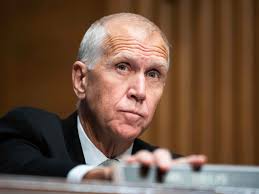Republican Sen. Thom Tillis of North Carolina won’t run in 2026 after opposing Trump’s bill

Senator Thom Tillis of North Carolina has announced he will not run for re-election in 2026. This decision came just one day after he publicly opposed a high-profile bill backed by former President Donald Trump. The move marks a sharp political shift and highlights deeper tensions within the Republican Party.
A Career of Conservative Balance Comes to an End
Tillis has served in the U.S. Senate since 2015. Over the years, he became known for walking a fine line between party loyalty and bipartisan negotiation. He often supported Republican priorities, but he also worked with Democrats on several key issues, such as immigration, veterans’ benefits, and judicial reform.
However, his moderate tone was not always welcomed. In recent years, as the Republican Party increasingly aligned itself with Trump’s hardline approach, Tillis found himself in a difficult position.
The Final Straw: Opposition to Trump’s Bill
The tipping point came when Tillis voted against Trump’s “One Big Beautiful Bill,” a massive tax-and-spending package. While Trump praised the bill as a way to boost the economy, critics pointed out it included steep cuts to Medicaid and favored wealthy corporations.
Tillis voiced his concerns openly. He called the bill “a step backward for working families and vulnerable communities,” drawing sharp criticism from Trump’s loyal base. Within hours, Trump lashed out on social media, calling Tillis “a traitor to the conservative cause.”
Trump’s Pressure and Tillis’ Decision
Following the backlash, speculation grew over whether Tillis would face a primary challenger in 2026. Many assumed he would prepare for a tough re-election fight. However, on June 29, 2025, he released a short but clear statement: he would not run again.
“It’s time to pass the torch,” Tillis said. “Public service is a calling, not a career. I leave with pride in what we’ve accomplished and hope for the future.”
His announcement underscored the personal and political toll of standing up to Trump. It also reflected a growing pattern—moderate Republicans often find themselves pushed out when they break with the former president.
A Competitive Senate Seat Now Up for Grabs
Tillis’ retirement immediately changed the political outlook for North Carolina. His seat is now one of the most competitive in the country, and both parties are preparing for a tough fight.
On the Republican side, several names are already in the mix:
- Michael Whatley, Republican National Committee chair and Trump loyalist
- Lara Trump, the former president’s daughter-in-law
- Rep. Richard Hudson, a traditional conservative
- Rep. Pat Harrigan, aligned with MAGA Republicans
Each represents a different part of the party. The outcome of the primary may signal the GOP’s direction for years to come.
Democrats See a New Opportunity
Democrats were quick to respond. Former Representative Wiley Nickel, who lost his seat narrowly in 2024, has already launched a campaign. Additionally, former Governor Roy Cooper is seriously considering a run. Cooper remains one of North Carolina’s most popular politicians.
If he enters the race, Democrats will have a strong chance at flipping the seat. With no incumbent and a divided Republican field, they may finally break through in a state that has remained just out of reach.
A Divided GOP and a Changing Political Landscape
Tillis’ departure is not just about North Carolina. It reflects a national trend. The Republican Party is becoming more ideologically rigid, and dissenting voices are increasingly rare.
Many moderates, like Mitt Romney and Lisa Murkowski, have faced backlash for opposing Trump’s agenda. Some have chosen retirement over political war. Tillis now joins that list.
In his farewell, he didn’t name Trump. But his message was clear: “Politics shouldn’t be about fear or feuds. It should be about service. I hope we return to that one day.”
What This Means for 2026 and Beyond
The 2026 Senate race in North Carolina is now a critical battleground. With Democrats defending tough seats in other states like West Virginia and Montana, they need new opportunities to maintain control of the Senate.
North Carolina has become more politically balanced over the last decade. Races there are often decided by small margins. This means every vote will count—and every message will matter.
National attention, big money, and high-profile endorsements are expected. The race could become one of the most expensive and closely watched contests of the cycle.
Conclusion: A Symbol of GOP’s Future Direction
Senator Thom Tillis’ retirement is more than just a personal decision. It’s a signal of where the Republican Party is heading. Leaders who oppose Trump—even slightly—are finding it harder to survive politically.
For voters in North Carolina and across the country, the 2026 race will test whether moderation still has a place in American politics. Will Republicans choose loyalty to Trump, or will they embrace broader values? That question will define not only this Senate seat, but perhaps the party’s future as well.






